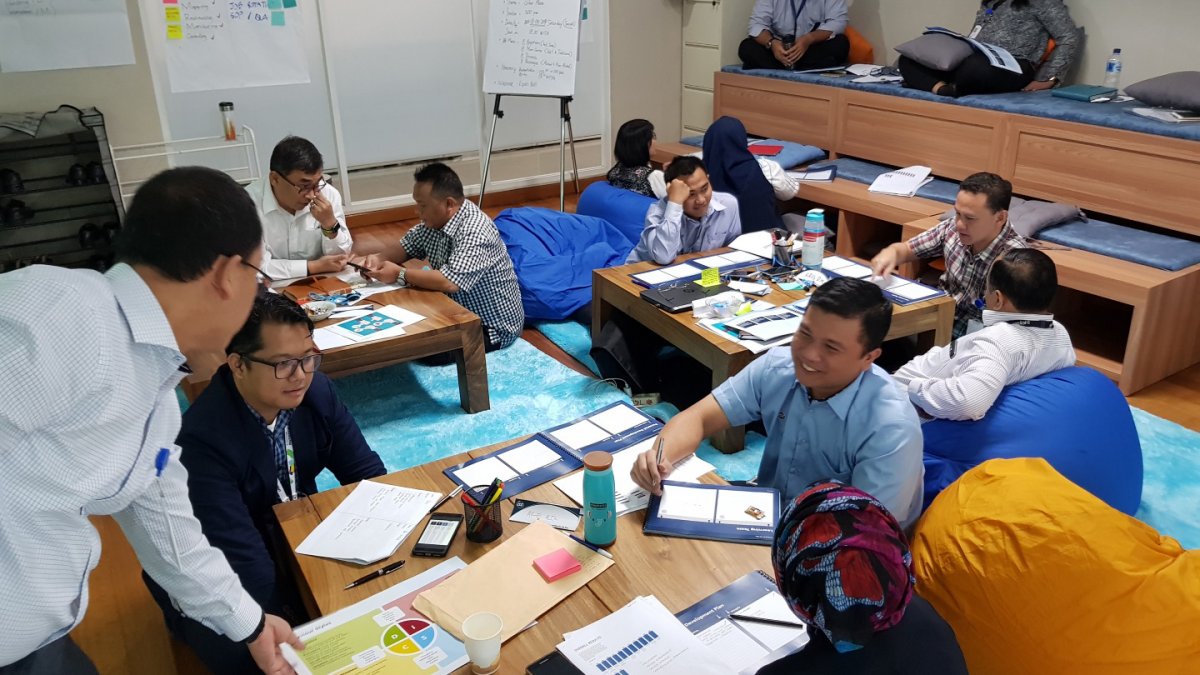-
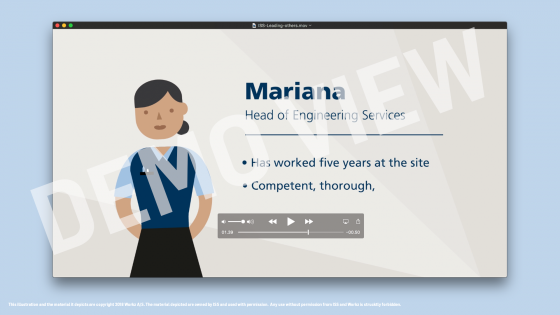 An animated movie introduces key elements of the game.
An animated movie introduces key elements of the game. -
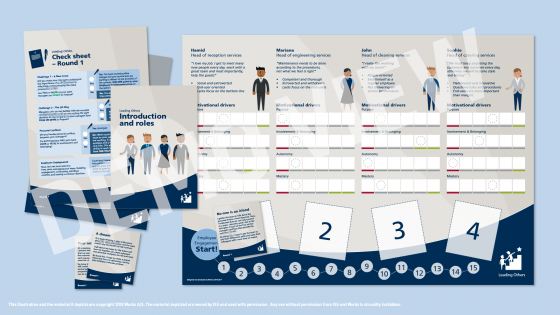 A leadership simulation is the backbone of modules 2 and 3.
A leadership simulation is the backbone of modules 2 and 3. -
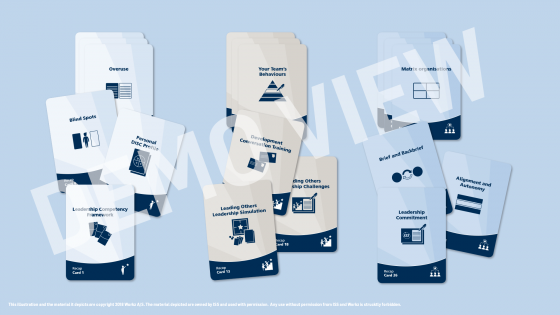 Modules 2 and 3 starts with a recap of the key learnings from the last module using a custom card deck.
Modules 2 and 3 starts with a recap of the key learnings from the last module using a custom card deck. -
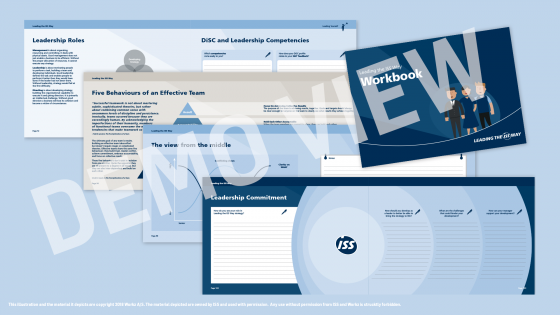 A 128 pages workbook binds the modules together.
A 128 pages workbook binds the modules together.
Many global corporations are facing the issue of creating a strong consistent leadership mind-set and matching behaviours that support both the high-level strategy and local engagement. ISS is a leading global facility service company and is currently embarking on such a journey with the ambitious leadership training programme “Leading the ISS Way” aimed at leaders of leaders and upwards in the organisation.
Our new global training program is unprecedented, both in scope and ambition.
The past year, Workz has year been working in close collaboration with Group Learning and Development from ISS on developing and deploying the programme. The programme was launched in the winter of 2017/2018 and is currently being rolled out in 40+ countries across the globe.
Leadership training as a transformation enabler
The program is designed to support the specific strategic transition ISS is undergoing these years. The strategy, The ISS WAY, aims to transform the company into a highly integrated, global service provider that delivers consistent solutions that help the customer focus on their own core business. ISS is thus undergoing a large and continual change from delivering single services – catering, cleaning, security and technical services – to providing a customer with complex and interconnected services with consistency across numerous international sites.
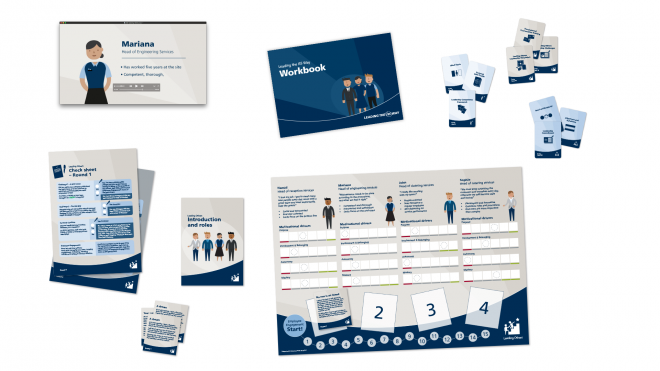
The programme’s focus is on creating a pragmatic and highly interactive learning experience that guides the participants to find and follow a clear personal development path as leaders of leaders in ISS.
The three modules of the training programme are based on ISS’ new leadership competency framework and uses a combination of engaging game-based learning, active training sessions, group-based reflections and feedback, as opposed to more theoretical training and one-way lectures.
This approach fits the very pragmatic “can-do” culture of the company as well as the overall goals for the programme which calls for a highly innovative, interactive and action-oriented approach. It is vital that the training experience and concepts directly reflects the content and leadership approaches that ISS wants to strengthen.
The programme is designed with the individual leader as the starting point, creating the basis to better understand our own leadership behaviour. Both as it relates to oneself, the people we lead and work with and the business as it is now and will be in the future.
| Module 1 | Module 2 | Module 3 |
|---|---|---|
| Leading Yourself | Leading Your Team | Leading the Business |
| This module has a primary focus on the theme “How can I develop and grow as a leader?” in connection to the expectations of being a leader in ISS. The module establishes the programme purpose as well as creating a baseline for self-awareness for each participant. |
This module connects the personal perspectives gained during module 1 with a focus on team dynamics and performance. In this module the participants work with the focus: “How can I help the people I lead find their purpose, deliver value and be successful?”. |
This module links the lessons from Module 1 and 2 with the ISS strategy and business model. The focus is on the question: “How can I lead a purpose driven culture and help bring the mission of ISS to life?”. |
Personal Learning Journey
A personal development track runs parallel to the three modules. In this track personal feedback and reflections are scaffolded and guided into a learning journey that both challenges and builds upon previous insights. Each module is concluded with home assignments that provide opportunities to test and implement new ideas and learnings between the modules. To support this process, each participant is provided with learning partners from the group that give feedback and encouragement between the modules.
Insights from designing “Leading the ISS Way”
Being a part of the development process of a leadership programme of this massive scale, provided us with numerous insights. Some of these are somewhat obvious – many of the same issues and themes that are relevant for leaders in smaller companies are also valid for a big company like ISS. However, there are several added layers of complexity when it comes to a deployment of this scale and scope:
- How do you design a “One size fits all” leadership development programme to a company with 480.000+ employees? Or perhaps the question should be: How do you design for local adaptability while sticking to the key central messages?
- How do you design a programme that can be run consistently across the globe by training professionals with very different cultures, backgrounds and professional approaches?
- How do you ensure a strong strategic fit with the global strategy?
During the design process, we worked in close collaboration with both ISS’ central learning and development team and with central stakeholders from the different regions – finding a way to handle these complexities.
Here are some of the key insights we gained in the design process:
1 - Frontloading stakeholders – creating alignment
Early in the process, a lot of time was spent with high level stakeholders in the organisation in order to make sure that the design goals, high level content and key messages were aligned. The involvement, off course, delayed the actual design process for the programme, but this was more than made up by the active involvement of key stakeholders. An involvement that created a strong alignment on the purpose and scope, as well as generated an active demand for the programme even before it was finished. Instead of seeing stakeholder management as something that was cumbersome but needed, the stakeholder involvement was seen as a driver for implementation that helped communicate the upcoming programme clearly and consistently across the organisation.
This approach was especially visible at ISS’ Global Top 400 Management Conference in Zürich the summer of 2017 where a sizeable part of the agenda was used as a launch platform for “Leading the ISS Way” about six months before the programme went live.
2 - Designing for other trainers
When designing most workshops or programmes a lot of implicit knowledge is involved. You are inspired by and reuse concepts or exercises that you have employed before and draw on your past successes. Many trainers experience difficulty conveying and sharing this personal experience with fellow trainers. All the implicit knowledge is not obvious to someone with another professional perspective and range of experience. When designing the “Leading the ISS Way” programme, the design had to fit a wide range of trainer profiles. From the very experienced Training and Development Consultant with a background in process facilitation and organisational psychology, to the junior training partner who has just been given their first large scale leadership training programme.
This led us to a design credo of designing for a “high ceiling and low threshold” – Scaffolding the process to enable younger trainers to run a good consistent process on the first deployment, while at the same time providing the experienced trainers with the room to use their own experience and techniques.
During the developing process we spent many resources on the visual design of the materials – helping to create clarity for the trainer by clearly communicating how each part of the material fitted together and by creating a comprehensive trainers guide outlining each step of the programme.
3 - Designing for Scale
The programme also had to be designed for large scale deployment with more than 10.000 potential participants. Thus, we created materials that both had a good quality feel to them and at the same time were relatively easy to translate and produce in local languages across the globe. Documentation, standardisation of material formats, well-structured translation tools etc. was key in order to enable the users to deploy the materials in a consistent way. In essence the programme is built to travel.
4 - Designing for Impact
The Leading the ISS Way programme is built on several physical and visual tools that introduce concepts, challenge the participants to see other perspectives, support constructive feedback and structure the learning process ahead.
The centrepiece is a personal workbook used across the three modules. The Workbook is designed to support a developing learning journey and contains exercises and “self-coaching” sections. It introduces core concepts and provides the framework for an action plan.
The programme also makes heavy use of game-based training by employing several tailor-made, full-fledged leadership simulations, dialogue games and role play exercises to create an engaging training experience that is close to home. These interactive elements are designed to connect the experience and knowledge of the participants with new concepts and an enhanced awareness of possible future actions.
The games become a conversational object that delivers content, frame and a procedure where the participants can explore, expand and challenge perspectives through their conversations about the games’ topics.
How has it been received?
I am especially happy about the very positive feedback we are getting on Leading the ISS Way
The programme is currently being rolled-out in 20+ countries by more than 40 internal and external trainers. It is still too early to make any conclusions regarding final impact and results, but the feedback from the global organisation so far has been exceptionally positive, both from participants and managers at all levels. In the words of Christian Lauritzen, the Global Head of Learning and Development at ISS:
“For ISS, our Leading the ISS Way programme is a key investment in our future. We are in the people business, and the development and growth of our global leadership team is vital for our success and ability to service our customers. Both today and in the future.
Our new global training program is unprecedented, both in scope and ambition. In an organisation of our size you have to commit 100% to create a significant impact. There is no room for halfway options.
Leading the ISS Way is already creating a shared reference and language across our organisation about leadership and what it means to lead our way forward.
It is fair to say that our organisation and culture is very customer-focused and results-driven. There is limited tolerance for long academic discussions or initiatives that don’t deliver tangible results.
Therefore, I am especially happy about the very positive feedback we are getting on Leading the ISS Way. Because I know that my colleagues worldwide would let me know instantly if we had introduced something that didn’t deliver value.”

